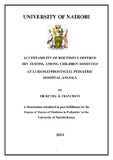| dc.contributor.author | Ketha, Francisco R. | |
| dc.date.accessioned | 2017-01-10T09:07:53Z | |
| dc.date.available | 2017-01-10T09:07:53Z | |
| dc.date.issued | 2014 | |
| dc.identifier.uri | http://hdl.handle.net/11295/100148 | |
| dc.description | A Dissertation submitted in part fulfillment for the Degree of Master of Medicine in Pediatrics’ at the University of Nairobi-Kenya | en_US |
| dc.description.abstract | Globally, more than 270,000 children under 15 years died of Acquired Immune Deficiency Syndrome (AIDS) in 2009. The antenatal HIV prevalence in Angola is 2.8% and in Lubango it is 2.2%. With the recent availability of Antiretroviral Therapy (ART), routine HIV testing is now an essential component of HIV prevention and care. However many HIV infected children are never identified or are lost from the health care system before they can be enrolled into care contributing to high mortality. It is therefore essential for health care workers in health facilities to recognize routine HIV testing and counseling strategies for admitted children.
Objectives: This study aims to determine the acceptability of routinely offered HIV testing among children admitted at Lubango Provincial Pediatric Hospital in Angola. In addition determine the factors associated with acceptability of HIV testing.
Design:Cross sectional study design.
Methods:The children admitted in the wards underwent a physical examination, test for HIV antibody and HIV DNA-PCR; those who tested positive were classified using the World Health Organization (WHO) criteria from November 2013 to January 2014.
Result:A total of 370 participants (caregiver- child pairs) were recruited into the study and their data analyzed.
Majority 81.3% of the caregivers were single with a mean age of 27 years.
Majority (88.1%) of the participants resided in the urban areas close to the hospital.
A significant number (86.7%) of the caregiver had some form of education with the majority having primary education.
Most (96.2%) caregivers were the biological mothers of the children.
The age distribution of the children was from one to 169 months with a median age of 13 months and an IQR of 8 to 22 months.
Acceptance rate of HIV testing was high, 341/370 (92%: 95%CI 89-94) of the caregivers accepted the children to be tested while 14 refused and 15 were undecided on HIV testing.
Fourteen children tested positive on rapid tests, of these 7 children under the age of 18 months. The children under the age of 18 months had their status additionally checked using a DNA- PCR. Out of these, four children tested positive.
Of those who were positive, majority of children 6 (54%) had stage two HIV disease and one had stage four disease.
After successful iterations at the multivariable modeling, the significant predictor for acceptability for HIV testing was education level and residence.
Education level was associated with acceptability for HIV testing. Caregivers with some level of education had 3 times higher odds of accepting the test compared to those with no education (3.34; 95% CI 1.02- 10.92, p= 0.05) after adjusting for all factors in multivariable model.
Urban dwellers were more likely to accept HIV testing OR = 4.4 (95% CI 1.41, 13.9) p= 0.02.
Parents of female children were less likely to accept HIV testing as compared to parents of boys children, 181 (98.3%) of 184 boys were tested compared to 160 (93.5%) of 171 girls.
Conclusion: The acceptability of routinely offered HIV testing (opt out) of children admitted at Lubango Pediatric Hospital was high (92%).The predictors of accepting a HIV test are maternal level of education and Residence.
Recommendation: HIV testing should be offered routinely to children admitted to Lubango Pediatric Hospital. | en_US |
| dc.language.iso | en | en_US |
| dc.publisher | University of Nairobi | en_US |
| dc.rights | Attribution-NonCommercial-NoDerivs 3.0 United States | * |
| dc.rights.uri | http://creativecommons.org/licenses/by-nc-nd/3.0/us/ | * |
| dc.title | Acceptability of Routinely offered HIV Testing among Children admitted at Lubango Provincial Pediatric Hospital-Angola | en_US |
| dc.type | Thesis | en_US |
| dc.description.department | a
Department of Psychiatry, University of Nairobi, ; bDepartment of Mental Health, School of Medicine,
Moi University, Eldoret, Kenya | |


